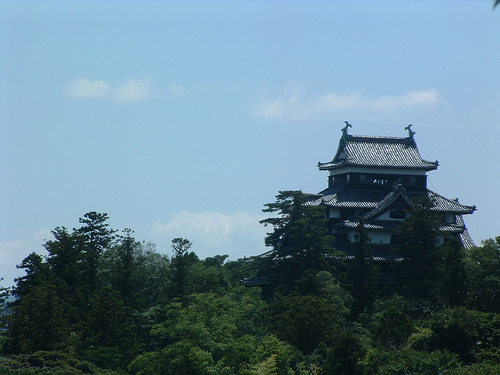Difference between revisions of "Matsue han"
| Line 7: | Line 7: | ||
*''Japanese'': 松江藩 (Matsue-han) | *''Japanese'': 松江藩 (Matsue-han) | ||
| − | Matsue han, based at [[Matsue castle]], ruled Shimane District in [[Izumo province]]. It was originally a ''tozama'' domain ruled by the [[Horio clan|Horio]] and [[Kyogoku clan|Kyôgoku clans]], and then became a ''shinpan'' domain when the [[Matsudaira clan (Echizen)|Echizen Matsudaira clan]] became the lords of Matsue, from the 1630s onwards. | + | Matsue han, based at [[Matsue castle]], ruled Shimane District in [[Izumo province]]. It was originally a ''tozama'' domain ruled by the [[Horio clan|Horio]] and [[Kyogoku clan|Kyôgoku clans]], and then became a ''shinpan'' domain when the [[Matsudaira clan (Echizen)|Echizen Matsudaira clan]] became the lords of Matsue, from the 1630s onwards. Along with [[Fukui han]], also ruled by the Echizen Matsudaira, Matsue was one of two ''shinpan'' domains of ''[[kunimochi]]'' status.<ref>[[Mark Ravina]], ''Land and Lordship in Early Modern Japan'', Stanford University Press (1999), 19.</ref> |
Following the [[battle of Sekigahara]], [[Horio Tadauji]] was granted Izumo and [[Oki province]]s, with a ''[[kokudaka]]'' of 240,000 ''[[koku]]''. He and his father [[Horio Yoshiharu]] based themselves at Matsue castle beginning in [[1611]], but after their successor [[Horio Tadaharu]] died without heirs, they lost control of the domain. [[Kyogoku Tadataka|Kyôgoku Tadataka]], who simultaneously oversaw the territory associated with the [[Iwami Ginzan]] silver mine<!--石見銀山の大森代官所支配-->, then became lord of Matsue in [[1634]], but he too died without an heir. As a result, in [[1638]], [[Matsudaira Naomasa]] was reassigned from [[Matsumoto han]] in [[Shinano province]], and became lord of Matsue with a ''kokudaka'' of 186,000 ''koku''. His descendants would remain the lords of Matsue for the remainder of the [[Edo period]], until the [[abolition of the han]] in the 1870s. | Following the [[battle of Sekigahara]], [[Horio Tadauji]] was granted Izumo and [[Oki province]]s, with a ''[[kokudaka]]'' of 240,000 ''[[koku]]''. He and his father [[Horio Yoshiharu]] based themselves at Matsue castle beginning in [[1611]], but after their successor [[Horio Tadaharu]] died without heirs, they lost control of the domain. [[Kyogoku Tadataka|Kyôgoku Tadataka]], who simultaneously oversaw the territory associated with the [[Iwami Ginzan]] silver mine<!--石見銀山の大森代官所支配-->, then became lord of Matsue in [[1634]], but he too died without an heir. As a result, in [[1638]], [[Matsudaira Naomasa]] was reassigned from [[Matsumoto han]] in [[Shinano province]], and became lord of Matsue with a ''kokudaka'' of 186,000 ''koku''. His descendants would remain the lords of Matsue for the remainder of the [[Edo period]], until the [[abolition of the han]] in the 1870s. | ||
Latest revision as of 17:34, 28 July 2014

- Territory: portions of Izumo province
- Castle: Matsue castle
- Lords: Horio clan, Kyôgoku clan, Matsudaira clan
- Kokudaka: 186,000
- Other Names: 雲州藩 (Unshuu han)[1]
- Japanese: 松江藩 (Matsue-han)
Matsue han, based at Matsue castle, ruled Shimane District in Izumo province. It was originally a tozama domain ruled by the Horio and Kyôgoku clans, and then became a shinpan domain when the Echizen Matsudaira clan became the lords of Matsue, from the 1630s onwards. Along with Fukui han, also ruled by the Echizen Matsudaira, Matsue was one of two shinpan domains of kunimochi status.[2]
Following the battle of Sekigahara, Horio Tadauji was granted Izumo and Oki provinces, with a kokudaka of 240,000 koku. He and his father Horio Yoshiharu based themselves at Matsue castle beginning in 1611, but after their successor Horio Tadaharu died without heirs, they lost control of the domain. Kyôgoku Tadataka, who simultaneously oversaw the territory associated with the Iwami Ginzan silver mine, then became lord of Matsue in 1634, but he too died without an heir. As a result, in 1638, Matsudaira Naomasa was reassigned from Matsumoto han in Shinano province, and became lord of Matsue with a kokudaka of 186,000 koku. His descendants would remain the lords of Matsue for the remainder of the Edo period, until the abolition of the han in the 1870s.
Naomasa created several branch domains, giving his second son Matsudaira Chikayoshi the 30,000 koku Hirose han, and his third son Matsudaira Takamasa the 10,000 koku Mori han. Matsue specialized in producing and exporting iron, cotton, ginseng, and tallow, but by the time of the 7th Matsudaira lord, Matsudaira Fumai, the domain's finances were in a tough situation. With the help of karô Asahi Tanba (aka Shigeyasu), he enacted a series of reforms which revived the domain's economy.
The domain school was called the Shûdôkan (修道館).
Around the time of the Meiji Restoration, the domain had to deal with an uprising by the islanders of the Oki Islands; the domain was abolished along with the rest in 1871, being replaced by Matsue prefecture, and then Shimane prefecture.
Lords of Matsue
- Horio Yoshiharu
- Horio Tadauji
- Horio Tadaharu (d. 1634)
- Kyôgoku Tadataka (1634-1638)
- Matsudaira Naomasa (from 1638)
- Matsudaira Tsunataka
- Matsudaira Tsunachika
- Matsudaira Yoshitô
- Matsudaira Nobusumi
- Matsudaira Munenobu
- Matsudaira Harusato (Fumai, 1767-1818)
- Matsudaira Naritsune
- Matsudaira Naritaka
- Matsudaira Sadayasu (until 1871)
References
- Pamphlet from Meimeian tearoom, Matsue.
- "Matsue han," Hanmei kyûkokumei ga wakaru jiten 藩名・旧国名がわかる事典, Kodansha, 2011.
- ↑ Unshû being a reference to Izumo province, the Un in Unshû being the same kanji as the second character of "Izumo."
- ↑ Mark Ravina, Land and Lordship in Early Modern Japan, Stanford University Press (1999), 19.